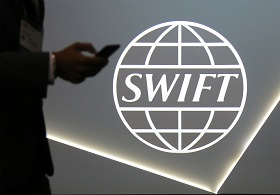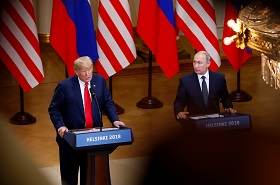The American federal law PL 115-44 (CAATSA) is well-known in Russia. It is associated with the codification of a large array of sanctions and other measures related to the Ukrainian crisis, the situation in Syria, Russian influence in Europe and Eurasia, etc.
The part of the law which resonates the most is that which specifies provisions against “Russian oligarchs”. At one time, the so-called “Kremlin report” (its open part) prompted a mixture of criticism and mockery for its superficiality. However, a number of CAATSA provisions were more global in nature, and not limited solely to Russia. They included articles 261 and 262, requiring the executive branch to prepare a national strategy to combat the financing of terrorism and other illegal financial transactions. The very spirit of CAATSA, with its anti-Russian inclination, made it possible to assume that the strategy would largely concern Russia. In particular, article 243 obliged the US government to prepare a similar report on Russia and update it annually until 2021. However, in the “Big strategy” of 2020, an updated version of which was issued strictly in accordance with the deadline set by Congress (January 31, 2020), Russia was hardly ever mentioned. The global risks it cites are associated with the illegal use of financial instruments; many other topics are covered and are only indirectly related to Russia, which is treated like any other country. However, for the relevant agencies, not to mention lawyers and corporate compliance departments, the Strategy will also be interesting. After all, many of the security challenges that are put forth by the Americans are relevant for our country.
The American federal law PL 115-44 (CAATSA) is well-known in Russia. It is associated with the codification of a large array of sanctions and other measures related to the Ukrainian crisis, the situation in Syria, Russian influence in Europe and Eurasia, etc.
The part of the law which resonates the most is that which specifies provisions against “Russian oligarchs”. At one time, the so-called “Kremlin report” (its open part) prompted a mixture of criticism and mockery for its superficiality. However, a number of CAATSA provisions were more global in nature, and not limited solely to Russia. They included articles 261 and 262, requiring the executive branch to prepare a national strategy to combat the financing of terrorism and other illegal financial transactions. The very spirit of CAATSA, with its anti-Russian inclination, made it possible to assume that the strategy would largely concern Russia. In particular, article 243 obliged the US government to prepare a similar report on Russia and update it annually until 2021. However, in the “Big strategy” of 2020, an updated version of which was issued strictly in accordance with the deadline set by Congress (January 31, 2020), Russia was hardly ever mentioned. The global risks it cites are associated with the illegal use of financial instruments; many other topics are covered and are only indirectly related to Russia, which is treated like any other country. However, for the relevant agencies, not to mention lawyers and corporate compliance departments, the Strategy will also be interesting. After all, many of the security challenges that are put forth by the Americans are relevant for our country.
Today, the United States occupies a leading position in the global financial system. The American dollar is a universal instrument of payment for transactions throughout the world. The American economy gains tremendous benefits while providing a favourable financial infrastructure for the whole world. But there are also problems. The first is the use of financial leadership for political purposes. The USA is the largest initiator of economic sanctions. Unlike any other country, the United States can afford to effectively impose sanctions regimes beyond its borders, effectively implementing them extraterritorially. Secondly, the colossal possibilities of the American system open up equally impressive opportunities for their use by organised crime, terrorists, corrupt officials and other fortune-seekers. Interestingly, such methods are widely used to circumvent US sanctions. That is, when faced with the first problem, targets of sanctions (individuals, organisations or even countries) often exacerbate the second one.
First of all, the authors of the Strategy mentioned as key threats money laundering and the financial support of a wide range of criminal activities (from drug trafficking to the slave trade and from cybercrimes to fraudulent activity), as well as the financing of terrorism and the proliferation of weapons of mass destruction. Despite the fact that terrorism and WMDs are the most important challenges to international security, they seem to be incomparable in their scope with the activities of racketeers.
Most interesting is the Americans’ assessment of the vulnerabilities of their financial system. To one degree or another, these are common to many countries. Moreover, almost all of them are somehow connected with the American financial system. Among the key vulnerabilities is a lack of information about the beneficiaries of companies. In the United States, it’s easy to establish a business and the authorities do not conduct many inspections. The result is a high degree of dynamism and an attractive investment climate. However, the toll for this is that it provides opportunities for criminals, who are able to abuse it by devising various schemes. Another vulnerability is real estate transactions, especially with respect to luxury property. Here one may find many opportunities for laundering illegal income. A separate problem is correspondent accounts and the intermediary operations of banks. Due to the dominant role of the United States in the global financial system, American banks make a huge number of payments. Moreover, they do not always understand the nature of the money which is transferred. As a result, banks can unwittingly assist in criminal schemes or violate established sanctions by providing payments to blacklisted individuals and organisations. Banks and other financial institutions themselves can employ people who intentionally break the rules for personal gain. And this applies to both sanctions regimes and criminal schemes. The good old problem is cash. The scale of cash payments, as well as cash smuggling, remains huge, despite the widespread adoption of electronic transactions.
The cyber environment itself is becoming a source of threats. This is not the first time that American regulators have paid close attention to crypto-currencies. They are used both to circumvent US sanctions (for example, the Venezuelan Petro), and for many criminal schemes that ensure anonymity and the secrecy of payments. At the same time, significant gaps remain in the corporate sector in adapting compliance services to new technologies, challenges and related legislative changes.
It is interesting that among the proposals for solving the problem there are both standard and relatively new steps. Among the standard ones are improving the efficiency of inter-agency cooperation, establishing partnerships between the state and business, and improving legislation. Among the relatively new ones are the use of artificial intelligence and data analysis technologies. If a violation cannot be fixed directly, then, apparently, it is possible to identify typical markers of suspicious transactions, which means narrowing the search and focusing efforts. This idea in itself is difficult to label as a new one, but artificial intelligence technologies can provide it with a qualitatively new meaning. However, violators will also be able to use such technologies over time.
A natural measure to counter such threats is international cooperation. However, problems may arise here. The existing global financial system is well-functioning and benefits countless people. But its use by Washington for political purposes will lead to retaliatory measures from other players. They may be increasingly interested in diversification away from the dollar in order to maintain their sovereignty. This portends the de-globalisation of world finance, and difficulties are bound to emerge in financial regulation amid new opportunities for criminals. Another problem is a conceptual one, and it is even more important. The desire of the Americans to combat racketeering is completely natural and correct. However, those who are subject to sanctions are put in the same category. In other words, bona fide criminals are being lumped together with systemic officials and organisations that are sanctioned for political reasons. The problem could be ignored if it only applied to individual “dictatorial regimes”. However, today they are increasingly affecting major players such as Russia and China. Americans will inevitably have to cooperate with these states in countering crime, while at the same time considering them the targets of their sanctions and other repressive measures. Such a duality exists today. The big question is how long it will last. In a worst-case scenario, the Americans’ excessive use of sanctions and other measures for political purposes will make anarchy an attractive means to preserve sovereignty. If that happens, everyone loses.
First published in the Valdai Discussion Club.






